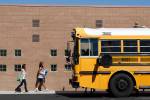Lottery money won’t go to education
To the editor:
Kudos to Dick Laird for his Monday letter about the state of Illinois creating a lottery to use the profits to "save" its education system. Mr. Laird was right on the mark when he stated that governments should not be in the lottery business; that the poor purchase most of the tickets; and, most importantly, that the education system did not benefit from the lottery profits.
I lived in Ohio in the 1970s. During this time, the state elected to create a lottery. It was presented to the voters as the absolute method to "save" the under-funded education system. It was voted in, and the lottery profits were in the hundreds of millions of dollars.
But education spending did not increase as a result of the lottery. Instead, the lottery profits were placed into the general fund, and spending was increased in other programs. The benefit to education from the lottery profits was zero.
Ohio and several other states with lotteries have attempted to distance their governments from operating their lotteries by contracting with a private firm to administer them. Whether the government or a private contractor managed the lottery, the result has been a record of graft, corruption and mismanagement.
I have lived in Nevada for 17 years, and I cannot imagine the elected officials avoiding the pitfalls of other state lottery operations. If you want to "save" the education system in Nevada, make it funding priority No. 1 and stop using education as a political football.
A lottery in Nevada would not help our education system, but our elected officials can.
Daniel J. Bell
LAS VEGAS
Not tenable
To the editor:
Sunday's newspaper had commentaries by state Sen. Dennis Nolan and Western High School math teacher Greg Barone, both describing unacceptable situations in the Clark County School District.
Mr. Nolan says it is unacceptable that disruptive students prevent other students from learning, and that they prevent teachers from teaching effectively. He also points out that the schools have little or no effective means in place to deal with the disruptors.
Mr. Barone says it's unacceptable that his high school students have been passed along from year to year without learning the math that they are supposed to be learning.
In my view -- and I taught for eight years at a local junior high -- both of these situations result from policy decisions (or the lack thereof) at the School Board level and/or at the building administration level. These problems are ignored year after year, which means they are accepted year after year.
As I see it, the entire administrative structure -- from the superintendent to the School Board of Trustees to the building administrators -- is delinquent in its duties. Why are they accepting that which is unacceptable?
Owen Nelson
LAS VEGAS
Democracy bad
To the editor:
I just read R. Gill's Sunday letter concerning the Electoral College. She, like millions of other Americans, does not understand why the Founding Fathers set this up.
They did not want the people voting directly for the president. They were fearful of a democracy. We are instead a representative republic. A democracy is dangerous.
They had read Plato's Republic. The had studied the Roman Senate. They strongly believed in states' rights. If you will look at the Declaration of Independence, you will note that it states "these united States ... ." It is a lowercase "U" folks.
We still have some states' rights left, even though Abraham Lincoln tried his best to dismantle the states. Lincoln was for a strong central government -- our first federalist president.
The states started losing their rights when the Constitution was amended to allow the direct election of U.S. senators. State legislatures used to choose the senators by vote of both houses (except Nebraska). Now the people vote on U.S. senators. Not a great idea.
And Assembly Bill 384, if passed, will be just one more wedge driven into states' rights. This bill would force Nevada's Electoral College members to vote for the candidate that has the most popular votes nationwide.
Again: Allowing the people to vote directly for the president moves us even closer to the so-hated democracy.
F. Eugene Barber
LAS VEGAS























